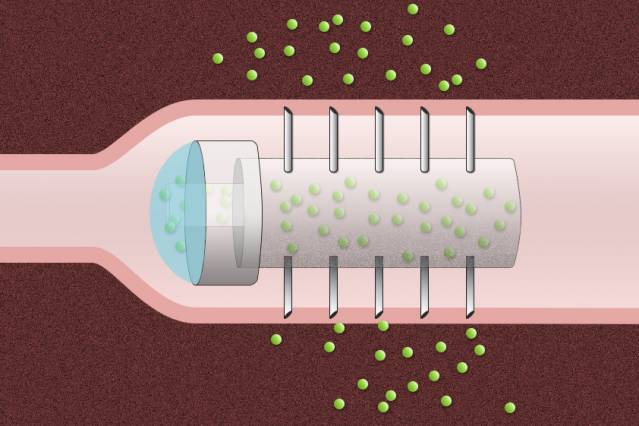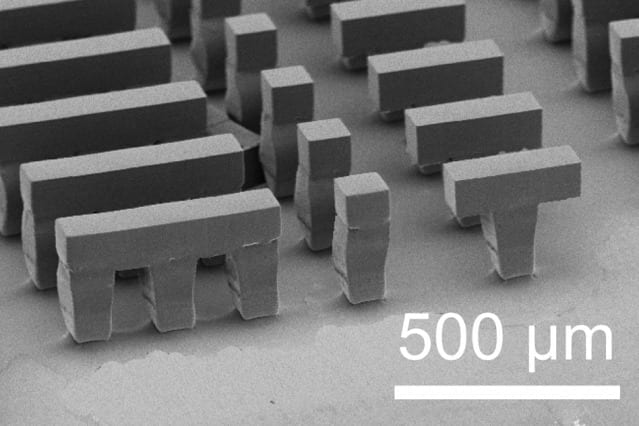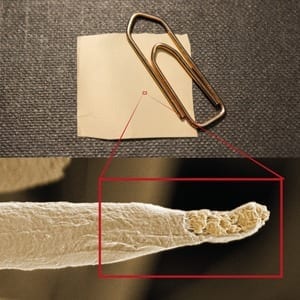
Image: Christine Daniloff/MIT, based on images by Carol Schoellhammer and Giovanni Traverso
Given a choice, most patients would prefer to take a drug orally instead of getting an injection. Unfortunately, many drugs, especially those made from large proteins, cannot be given as a pill because they get broken down in the stomach before they can be absorbed.
To help overcome that obstacle, researchers at MIT and Massachusetts General Hospital (MGH) have devised a novel drug capsule coated with tiny needles that can inject drugs directly into the lining of the stomach after the capsule is swallowed. In animal studies, the team found that the capsule delivered insulin more efficiently than injection under the skin, and there were no harmful side effects as the capsule passed through the digestive system.
“This could be a way that the patient can circumvent the need to have an infusion or subcutaneous administration of a drug,” says Giovanni Traverso, a research fellow at MIT’s Koch Institute for Integrative Cancer Research, a gastroenterologist at MGH, and one of the lead authors of the paper, which appears in the Journal of Pharmaceutical Sciences.
Although the researchers tested their capsule with insulin, they anticipate that it would be most useful for delivering biopharmaceuticals such as antibodies, which are used to treat cancer and autoimmune disorders like arthritis and Crohn’s disease. This class of drugs, known as “biologics,” also includes vaccines, recombinant DNA, and RNA.
“The large size of these biologic drugs makes them nonabsorbable. And before they even would be absorbed, they’re degraded in your GI tract by acids and enzymes that just eat up the molecules and make them inactive,” says Carl Schoellhammer, a graduate student in chemical engineering and a lead author of the paper.
Safe and effective delivery
Scientists have tried designing microparticles and nanoparticles that can deliver biologics, but such particles are expensive to produce and require a new version to be engineered for each drug.
The Latest on: Drug-delivery capsule
[google_news title=”” keyword=”Drug-delivery capsule” num_posts=”10″ blurb_length=”0″ show_thumb=”left”]
via Google News
The Latest on: Drug-delivery capsule
- NTU scientists develop revolutionary drug delivery system inspired by caterpillarson May 7, 2024 at 8:47 pm
has created a novel drug delivery system that draws inspiration from the natural world. Using the unique self-assembling properties of proteins found in moth caterpillars, the researchers designed ...
- Empty Capsules Market Size to Surpass USD 5.23 Billion by 2030, Exhibiting a CAGR of 8.1%on May 3, 2024 at 9:59 am
Allied Market Research published a report, titled, “Empty Capsules Market by Product (Gelatin Capsules and Non-Gelatin Capsules), Raw Material (Pig Meat, Bovine Meat, Bone, Hydroxypropyl ...
- Scientists learn from caterpillars how to create self-assembling capsules for drug deliveryon April 26, 2024 at 8:00 am
Self-assembling molecules that spontaneously organize themselves to form complex structures are common in nature. For example, the tough outer layer of insects, called the cuticle, is rich in proteins ...
- Diamond dust as a potential alternative to contrast agent gadolinium in magnetic resonance imagingon April 25, 2024 at 7:37 am
An unexpected discovery surprised a scientist at the Max Planck Institute for Intelligent Systems in Stuttgart: Nanometer-sized diamond particles, which were intended for a completely different ...
- Diamond dust shines bright in Magnetic Resonance Imagingon April 24, 2024 at 5:00 pm
The research scientist, who heads the Central Scientific Facility Medical Systems at MPI-IS, was surprised when she put the 3 to 5 nanometer particles into tiny drug-delivery capsules made of gelatin.
- Eli Lilly developing capsule device for drug delivery through GI wallon April 9, 2024 at 5:00 pm
Eli Lilly and Co. continues its development of an oral drug delivery device that can successfully deliver a drug that would otherwise be ineffective when taken orally. BioWorld MedTech Drug design, ...
- Nanocapsules: Tiny Vessels for Targeted Drug Delivery and Beyondon April 7, 2024 at 9:44 pm
These tiny capsules typically range in size from 10 to 1000 nanometers ... and tunable release profiles. They are widely used in drug delivery and biomedical applications. Lipid nanocapsules are ...
- Lithium Carbonate Capsuleson September 16, 2020 at 3:08 pm
Elderly. Neonates. Pregnancy: monitor; discontinue or reduce dose 2–3 days prior to delivery. Nursing mothers: not recommended. Lithium toxicity potentiated by diuretics, ACE inhibitors ...
- Zanaflex Capsuleson April 11, 2012 at 6:47 am
May sprinkle contents of capsules on applesauce (may affect absorption ... Avoid abrupt cessation. Elderly. Labor & delivery. Pregnancy. Nursing mothers. Avoid other α 2-agonists (eg, clonidine).
via Bing News










